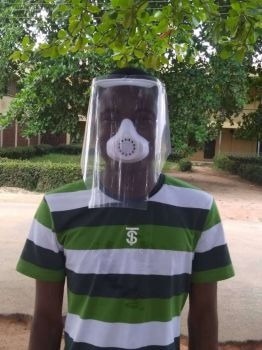According to a newly released academic study, researchers at the University of Sussex and its collaborators in Nigeria used open-source designs and 3D printing to lessen the personal protective equipment (PPE) shortages for a community in Nigeria during the COVID-19 outbreak.

Image Credit: University of Sussex
Dr. Royhaan Folarin from the Olabisi Onabanjo University in Nigeria and Dr. Andre Maia Chagas from the University of Sussex describe in the paper PLOS Biology how their collaboration resulted in the creation of over 400 pieces of personal protective equipment (PPE) for the nearby hospital and the community at large, including those providing vital and frontline services.
This includes face masks and face shields, which were previously unavailable to traditional businesses due to a global scarcity.
They collaborated using open-source designs that already existed and provided instructions for producing authorized PPE. This made it possible for Nigerian researchers to acquire, construct, and utilize a 3D printer so they could start creating and distributing protective gear for the benefit of the local population. And, it was reasonably priced.
A face shield costing 1,200 Naira (£2.38) and created by one 3D printer operator and one assembler in 1 hour 30 minutes on average, and a mask costing 2,000 Naira (£3.97) in 3 hours 3 minutes. Comparatively, at the time of the project, reusable masks cost 10,000 Naira (£19.84) and face shields cost at least 5,000 Naira (£9.92).
Through knowledge sharing, collaboration and technology, we were able to help support a community through a global health crisis. I am really proud of the tangible difference we made at a critical time for this community. As PPE was in such high demand and stocks were low, prices for surgical masks, respirators, and surgical gowns hiked, with issues arising around exports and international distribution.
Dr. Maia Chagas, Research Bioengineer, University of Sussex
Dr. Chagas added, “We quickly realized that alternative means of producing and distributing PPE were required. Free and open-source hardware (FOSH) and 3D printing quickly became a viable option. We hope that our international collaboration during the pandemic will inspire other innovators to use technology and share knowledge to help address societal problems, which were typically reliant on funding or support from government or large research institution.”
“With open source designs, knowledge sharing, and 3D printing, there is a real opportunity for us to start addressing problems from the ground up, and empower local communities and researchers,” stated Dr. Chagas.
During the pandemic, we saw the successful printing and donation of PPE in the Czech Republic by Prusa Research and it became a goal for me to use the training I had received in previous TReND in Africa workshops to help impact my immediate community in Nigeria.
Dr. Royhaan Folarin, Neuroscientist and Lecturer, Anatomical Sciences, Olabisi Onabanjo University in Nigeria
The TReND in Africa network, an organization based in Sussex that promotes the development of scientific competence throughout Africa, is what gave rise to the worldwide partnership.
The PPE’s innovativeness, usefulness, and aesthetics were praised by testers after initial use. Even though the team’s 3D printer was not designed for large-scale serial manufacturing, the testers recognized the potential for multiple 3D printers to operate in parallel to speed up relative production time.
This was successfully proved during the epidemic by the company Prusa Research, which made and transported 200,000 CE-certified face shields.
Journal Reference:
Folarin, R. O., et al. (2022) Bypassing shortages of personal protective equipment in low-income settings using local production and open source tools. PLOS Biology. doi:10.1371/journal.pbio.3001658.